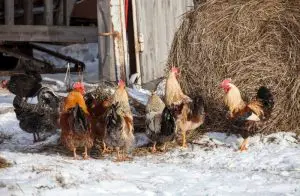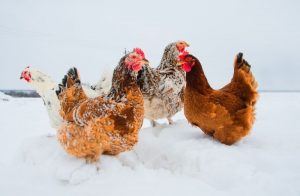How To Care For Chickens in the Cold
When it comes to caring for your livestock and poultry, it’s important to know how different weather conditions can affect each animal. Farm animals that aren’t prepared for the cold will be at risk of cold stress and hypothermia. If you have chickens, you may be wondering how they will handle the winter months since they usually live outside.
Do chickens get cold? Due to thick double-layered plumage and a high average body temperature, chickens are highly cold-tolerant even in extreme conditions. As long as your chickens have a dry shelter to can escape to, they will usually be able to survive subfreezing temperatures.
Although chickens are cold-tolerant by nature, it doesn’t mean you can completely ignore them when winter comes. There are steps you can take to ensure your chickens’ comfort and survival in the winter months. Keep reading to learn more about how to care for your chickens in the cold.
Help Your Chickens Survive in the Cold
Chickens are a type of poultry that does well in the cold. They have multiple layers of feathers that keep their body insulated and protected from the chill. Chickens also have a body temperature of between 105° – 107° Fahrenheit (40.6° – 41.7° Celcius). This helps them to stay warm even in colder temperatures.
Although chickens are cold-hardy, extreme winter conditions can threaten them with risks of hypothermia and cold stress. Hypothermia is when the body temperature drops below normal and vital organs begin to shut down. These health conditions are usually the result of cold and wet environments.
Here are some tips to help your chickens survive the winter:
Use Extra Insulation in Your Chicken Coop
You can use extra bedding in your chicken coop during the winter months to help the coop stay warm and add a layer of comfort for your chickens. Cold can seep into the chicken coop from the cold ground, so covering the ground level of your coop with straw or sawdust can help keep the cold out.
It’s important to note that certain bedding can pollute the air of your chicken coop with dust, making it more difficult for your chickens to breathe. Before choosing extra bedding to put down in the coop, you should know what works best for your chickens. Straw is usually the best choice for insulation and air quality; however, it will need to be cleaned out more frequently as mold can form on it.
You can also insulate the walls of your chicken coop and avoid drafts by stacking hay bales or sawdust bags around the outside of the coop.
Did you know that chickens aren’t the only birds that need a coop? Check out my article Do Ducks Need a Coop: What You Need to Know.
Take Measures to Ensure the Inside of the Coop Stays Dry
You should start preparing your chicken enclosure and coop before winter hits. One necessity your chickens will need during the winter is a dry coop. If your chickens are nesting in a wet or humid coop, they run a risk of catching hypothermia. Take time before it gets cold to winterize your chicken coop.
To winterize your chicken coop, fix any leaks or cracks that may allow water in. You can also cover the outside and the floor of the coop with a tarp to keep moisture out. While you do this, make sure your coop will still have good air ventilation. Poor ventilation can cause moisture, aromas, and dust to build up in the coop that can be bad for your chicken’s health.
Provide Extra Chicken Feed to Your Chickens.
While your chickens may be happy scavenging for bugs out in the yard, you should provide them with extra feed to supplement their diet during the winter. During the cold months, most bugs will die off, leaving your chickens with less to eat.
You can provide your chickens with chicken feed and dried corn. Be sure to place some dried corn in the chicken coop at night so the chickens will be able to eat and stay warm. Many livestock and poultry animals eat to stay warm, and chickens are no different. Eating will help their bodies produce more energy, which will help to keep them warm.
Let the Chickens Come and Go as They Please
When it’s cold, chickens may go in the coop to rest, huddle together, and stay warm; however, many chickens like to continue to forage and peck around the yard even with snow on the ground. You may be wondering what you should do with your chickens during inclement winter weather.
Believe it or not, but chickens are good at deciding whether or not they should be outside or in their chicken coop. While you may be tempted to shut your chickens into their coop during bad weather, this may cause your chickens some unnecessary stress. You can let your chickens out, but just make sure they have access to the coop if they rather stay in.
Cover Snow With Straw or Sawdust so Your Chickens Can Go Outside
 Some chickens will go out in the snow while others won’t. While certain chicken breeds may be more apt to go out in the snow, it seems that chickens make the decision on an individual basis. As mentioned earlier, even if your chickens don’t want to go outside right away after a fresh snowfall, give them the option by providing access to the outside.
Some chickens will go out in the snow while others won’t. While certain chicken breeds may be more apt to go out in the snow, it seems that chickens make the decision on an individual basis. As mentioned earlier, even if your chickens don’t want to go outside right away after a fresh snowfall, give them the option by providing access to the outside.
One way you can make going outside more appealing to your chickens is by covering the snow around their coop with straw or sawdust. They may be more apt to walk out over the bedding compared to walking in the cold snow. This will help your chickens get out and get some fresh air while still maintaining a level of comfort.
Make Sure Your Chickens Have Roosting Poles
One way you can help your chickens stay warm is by providing roosting poles both inside the coop and outside in their enclosure. Roosting poles are beams set a few feet off the ground for your chickens to stand on. Chickens can stand on these poles and escape the cold of the ground. You may see multiple chickens on the roosting poles at one time, all huddled together. By huddling together, the chickens can help each other stay warm.
Chickens will also rest and fluff their feathers as they roost. Feathers that are fluffed together provide more insulation and protection compared to feathers that lay to the side. This will help to protect your chickens from the cold.
Regularly Clean Out the Chicken Coop
During the winter months, your chickens may spend much more time in their coop than normal. Nights will be long and cold days may deter them from going outside. Because of this, chicken waste can accumulate much faster than usual. Dirty conditions aren’t healthy for anyone, including chickens, so it’s important to clean out your chicken coop more regularly during the winter.
Another reason to clean out the chicken coop routinely is to remove the extra bedding. If you put straw on the floor of your coop to keep it more insulated, straw can become moldy if left for too long. Cleaning the coop will also enable you to check for excessive moisture in the coop.
Make Sure Your Chickens Have Access to Water
It’s important that you provide your chickens with access to water both in their coop and in their enclosure. If the chickens are reluctant to go out in inclement weather, they should be able to find water and food in their coop.
It’s also important to ensure that your chickens’ water doesn’t freeze over. Frozen water can lead to dehydration in your chickens. There are heated chicken waterers you can invest in for the winter months.
Frequently Asked Questions
Should I Use a Heat Lamp For My Chickens During the Winter?
You may be tempted to provide your chickens with some extra warmth during the winter months by putting a heat lamp in their coop. While this may be an appealing idea initially, you should avoid doing this. Putting a heat lamp in a chicken coop can be a fire hazard. One of the best ways to ensure your chicken’s comfort during the cold months is to provide them with a dry coop and some extra insulation.
How Do I Tell if My Chicken Has Hypothermia?
Your chickens may have hypothermia if they seem fatigued and are laying outside in the cold. One of the main ways you’ll be able to tell if your chicken has hypothermia is if they are cold to the touch. Chickens have a naturally high body temperature, so if their body is cold, that’s a good sign that something is wrong.
Young chickens and old chickens are more susceptible to hypothermia and cold stress than healthy adult chickens. For this reason, it’s important to keep your eye on any chickens that may meet these criteria.
I hope this article was helpful to you when it comes to caring for your chickens in the cold. Chickens are hardy animals, but you can ensure their comfort and survival by taking extra precautions during the winter months.
Do you have sheep? Did you know that sheep can be affected by the cold too? To learn more, read my article Leaving Sheep Out in the Rain: Everything You Need to Know.

